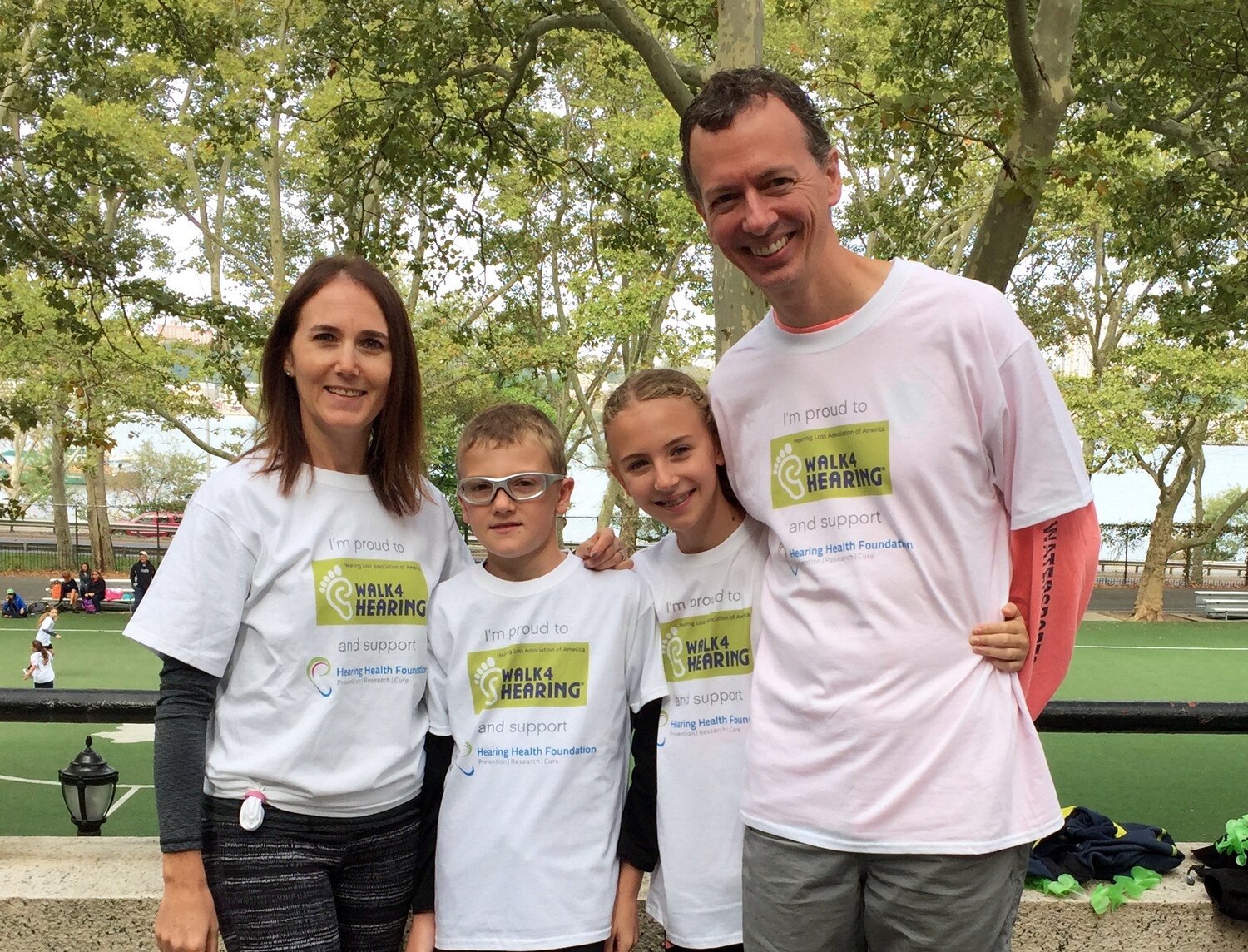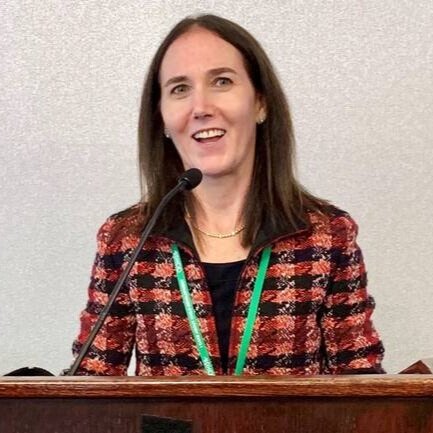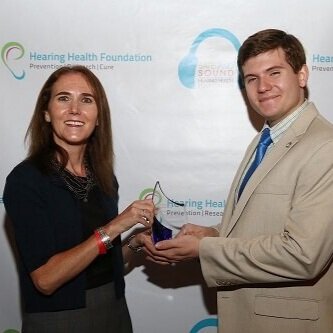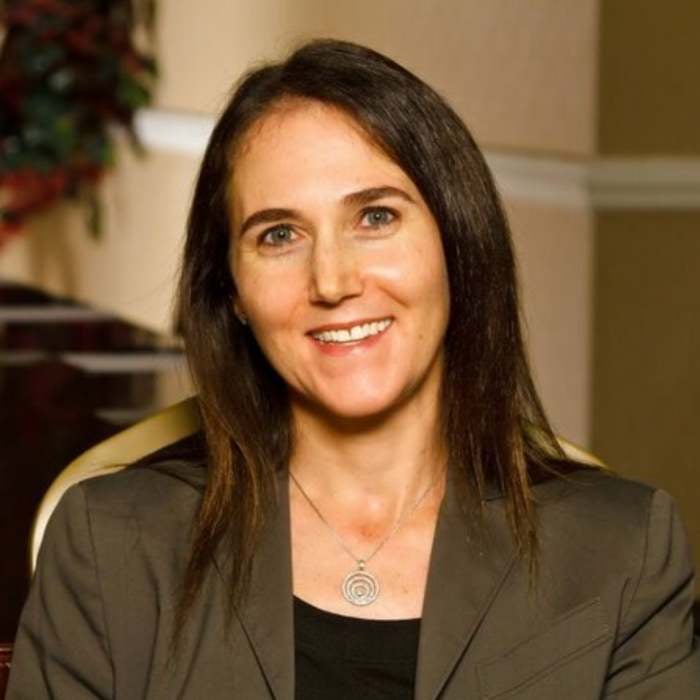Key Takeaways:
- Shari Eberts advocates for individuals with hearing loss by sharing her own story, empathy, and shared goal to reduce stigma around hearing loss and normalize treatment and self-advocacy.
- Education and awareness around hearing loss are key to reducing stigma and making progress.
- For individuals who have hearing concerns, getting a hearing test is an important first step to make an informed choice about treatment options.

I recently had an opportunity to ask Shari Eberts a few questions about her hearing loss story and what inspires her advocacy work. I found the conversation truly uplifting and came away motivated to end the stigma around hearing loss and hearing aids. Shari Eberts is an author, mother of two, NYC resident, and avid yogi. She began writing on her popular blog, Living With Hearing Loss, to process her hearing journey. She has authored pieces for the Huffington Post, Psychology Today and the Ida Institute. Shari also serves on several boards, including The Hearing Loss Association of America.
I hope you enjoy this conversation and are inspired to join in the effort to push back against hearing loss stigmas.
Q: Where does your hearing loss story start?
My hearing loss story began in my early childhood, watching my father struggle with his own hearing issues. He wore one hearing aid, then two, but always kept his sideburns grown long over his ears to hide them, even when this was no longer in fashion.
Hearing loss was an unmentionable topic in my home, as my father sought to hide his “weakness” from everyone in his life. His inability to tell others about his hearing issues prevented him from getting any assistance. I don’t remember him ever asking us to speak louder or to let him switch seats with one of us so he could hear better. I do remember him sitting off by himself at family events looking sad and alone.
When I was diagnosed with hearing loss in my mid-20s, I was terrified. Would I now be the one spending my time sitting alone at social events and isolating myself from my family and friends? Sadly, I was heading in that direction. I would fake my way through conversations and avoid colleagues at work that were hard for me to hear. Denial and shame were my constant companions. It took me over 10 years to shake them.
Eventually, my hearing loss worsened to the point where I could no longer wing it. I needed hearing aids, but when I purchased my first pair, I hated wearing them. I remember sticking them in my ears at the last minute before important meetings at work and ripping them out as quickly as possible afterward. I was following in my father’s footsteps of embarrassment and concealment.
But then I had children of my own. I saw them watching me hide my hearing loss and being embarrassed by it and knew I was perpetuating the cycle of stigma I had learned from my father. I needed to make a change, especially since my hearing loss is genetic, and I may have passed it down to them.
So, I did. I began wearing my hearing aids all the time, asking for quieter tables at restaurants, and teaching my friends and family the best practice communication tips that help me hear my best. My life improved considerably. I began volunteering at hearing loss related non-profits and found others who understood my struggles.
Meeting other people with hearing loss helped me heal. That is why I turned to advocacy, writing a blog called LivingWithHearingLoss.com, and serving on the National Board of Hearing Loss Association of America. I hope that by sharing my story, I will help others live more comfortably with their own hearing issues.

Q: You’ve become a force in the hard of hearing community. What inspired you to begin publishing on the topic?
Inspired by my children, I was able to overcome the strong stigma about hearing loss that pervaded my childhood home. I suspected others might be battling the same feelings, so I started my blog to share what I had learned along my journey.
My blog started almost as therapy for myself — sharing my fears and the workarounds I use in a variety of situations — but it has grown into so much more. Living With Hearing Loss is now a warm global community for people with hearing loss. We share the tips and tricks we use to navigate life and provide support to one another as we work to overcome the challenges of living with hearing loss.
I also advocate for people with hearing loss within the audiologist community. Through my writing and speaking, I share my story with audiologists to help them better understand the patient’s perspective. My e-book Person-centered Care from the Patient Perspective encourages audiologists to make their practices more focused on the needs of each patient.


Q: You talk a lot about hearing loss stigma. How do we change the conversation?
Education and awareness are two important factors for helping to break down stigmas of all types. Hearing loss is hard to understand because it is an invisible disability. When we ignore something someone says to us or answer a question the wrong way, people assume we are rude or slow, but the real problem is that we didn’t hear them.
Being vocal about hearing loss and making it more visible will help break some of these stigmas. That is why I try to write for mainstream outlets whenever possible. The more people understand about hearing loss, the more likely it is that the stigma will fade away.
New OTC hearing devices will also likely help to break down stigma about wearing hearing aids as new form factors and varied use cases drive hearing devices into the mainstream. While standards for this new class of devices were expected in August, Covid-19 has created delays.
Q: Are there hearing loss communities or blogs that you follow and recommend?
There are so many great ones! I always enjoy Gael Hannan’s humorous take on living with hearing loss as well as the informative articles on Hearing Tracker. Hearing Loss Association of America also has an active private Facebook group with excellent articles and supportive discussions about a variety of hearing loss topics.
Q: What would you say to someone who knows they might have hearing loss but aren’t sure if they are ready for hearing aids?
Step one is to get your hearing tested so you have the best information on hand to make an informed decision about hearing aids. I understand the stigma and the hesitation that some people feel about getting hearing aids because I lived through them myself, but there are so many important reasons to take care of your hearing.
The first is your health. Untreated hearing loss is associated with many health problems, including diabetes, cardiac issues and a higher incidence of dementia.
The second is your happiness. Hearing aids are not perfect — they do not restore your hearing to normal like glasses do for vision problems — but with consistent use, they make it easier to communicate and help you stay engaged in life. I am so grateful for mine.
The third is you have nothing to lose and everything to gain. Hearing aids come in many shapes, sizes and price points, including hearables options for people with mild to moderate hearing loss. All reputable products come with at least a 30-day trial period, so why not give them a try? You might be surprised by what you have been missing.






